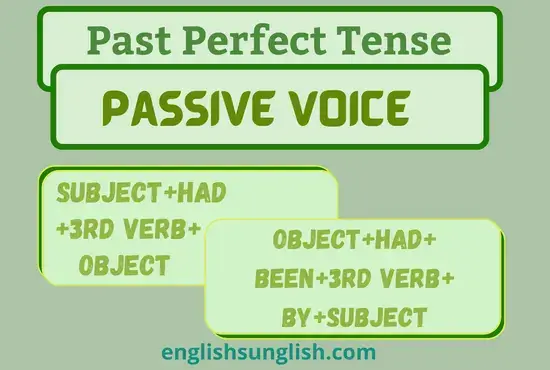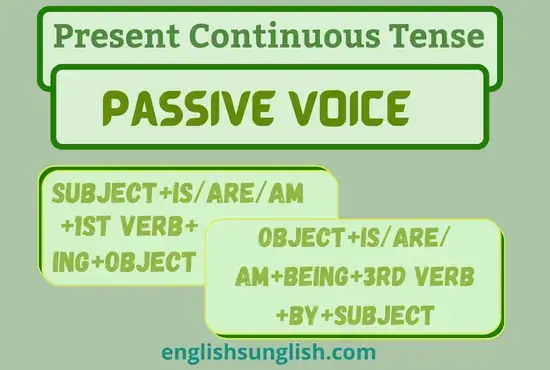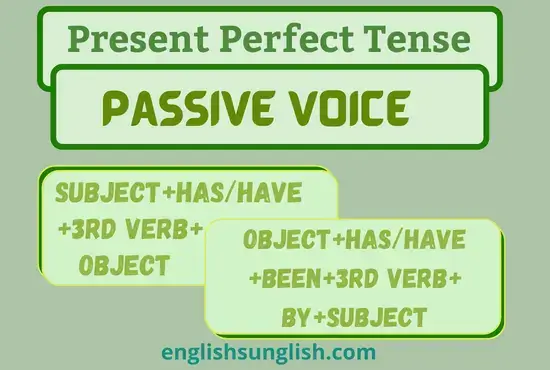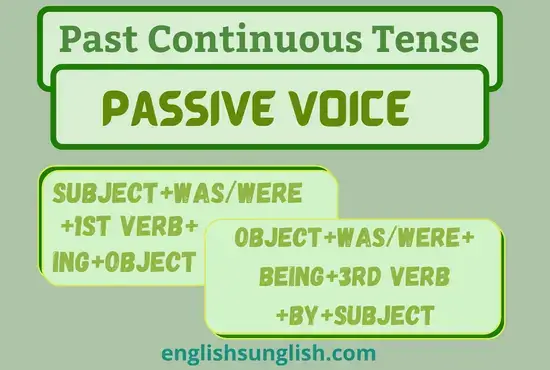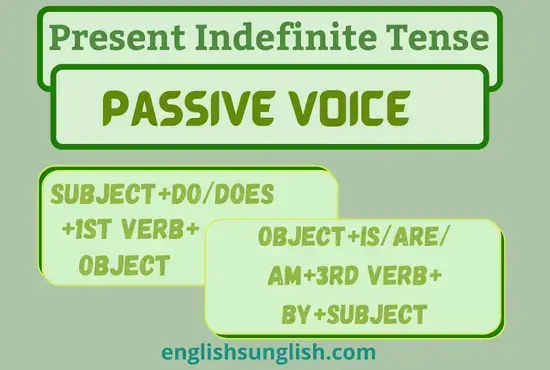Future Perfect Tense-Passive Voice
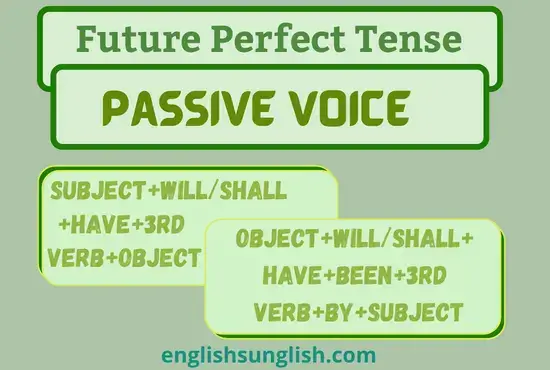
The Passive Voice of the Future Perfect Tense of different sentences can be made by following the following rules depending on the type of sentence:
Helping Verbs of Passive Voice of Future Perfect Tense
Passive Voice sentences of Future Perfect Tense use the following two helping verbs with respective singular and plural nouns and pronouns:
“Will Have Been” As Helping Verb in Passive Voice of Future Perfect Tense
“Will have been” is used as a helping verb in Passive Voice Sentences of Future Perfect Tense with all singular nouns and with the following pronouns:
- You
- They
- He
- She
- It

“Shall Have Been” As Helping Verb in Passive Voice of Future Perfect Tense
“Shall have been” is used as a helping verb in Passive Voice Sentences of Future Perfect Tense with the following pronouns:
- I
- We

However, vocabulary important role in making sentences of all perfect tenses, because it requires the 3rd Verb. One may fail to learn it correctly if one does not have enough collection of words. So first, learn how to make words and use them, then go with making perfect tense sentences.
Enhance Vocabulary Through Wordle Unlimited
Wordle Unlimited is a popular word-guessing game that can be a fun and engaging way to enhance your vocabulary. It helps in building vocabulary in a more creative way, that is, it offers different modes to its users. For example, it offers word games, so that users easily learn words by enjoying games. Moreover, it provides users with a proper system in which users use words in a different context. Using the same word in different contexts makes users more confident about how to use vocabulary, confidently in daily life.
Passive Voice of Assertive Sentences of Future Perfect Tense
The Passive Voice of Assertive Sentences of Future Perfect Tense can be made by applying the following sequence of rules:
- Convert the object of the Active Voice Sentence into the subject of the Passive Voice Sentence.
- Use the helping verb will have been/shall have been according to the subject of the Passive Voice Sentence.
- Use 3rd form of the Verb.
- Then use the word “by”, to show the doer.
- Then convert the subject of the Active Voice sentence into the object of the Passive Voice sentence.
- In the end, add the remaining words if there are any in the Active Voice Sentence.
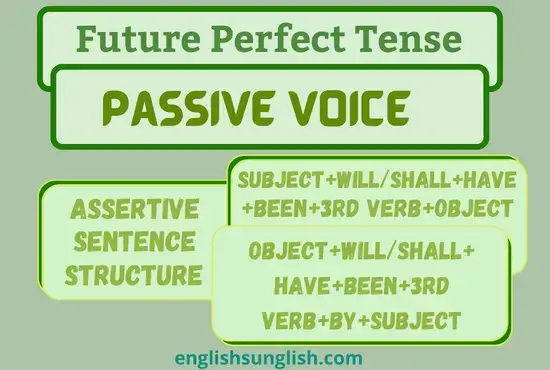
Examples of Passive Voice of Assertive Sentences of Future Perfect Tense
- I shall have won a prize.
- A prize will have been won for me.
- He will have finished that book.
- That book will have been finished by him.
- She will have learned this poem by heart.
- This poem will have been learned from her by heart.
- We shall have pleased them.
- They will have been pleased with us.
- He will have copied my letter.
- My letter will have been copied by him.
- He will have joined that college.
- That college will have been joined by him.
- They will have selected me for the post.
- I shall have been selected by them for this post.
- She will have bought some gifts for her friends.
- Some gifts will have been bought by her for her friends.
- They will have auctioned my car.
- My car will have been auctioned by them.
- She will have returned the tickets by now.
- The tickets will have been returned by her by now.
- He will have written this letter.
- This letter will have been written by him.
- I shall have bought a new pen.
- A new pen will have been bought by me.
- He will have killed the wolf.
- The wolf will have been killed by him.
- They will have occupied those seats.
- Those seats will have been occupied by them.
- She will have prepared tea for the guests.
- Tea will have been prepared by her for the guests.
- We shall have sent her to London.
- She will have been sent to London by us.
- I shall have dismissed him.
- He will have been dismissed by me.
- She will have remitted your fine.
- Your fine will have been remitted by her.
- He will have spoiled everything.
- Everything will have been spoiled by him.
- He will have changed his clothes.
- His clothes will have been changed by him.
- I shall have written a letter to him.
- A letter will have been written by me to him.
- He will have painted that door.
- That door will have been painted by him.
- A snake will have bitten her.
- She will have been bitten by a snake.
- He will have pressed the button.
- The button will have been pressed by him.
- I shall have taught this poem.
- This poem will have been taught by me.
- He will have burnt those letters.
- Those letters will have been burnt by him.
- She will have bought two tickets.
- Two tickets will have been bought by her.
- They will have caught the thief.
- The thief will have been caught by them.
Passive Voice of Negative Sentences of Future Perfect Tense
The Passive Voice of Negative Sentences of Future Perfect Tense can be made by applying the following rules:
- Convert the object of the Active Voice Sentence into the subject of the Passive Voice Sentence.
- Use the helping verb will /shall according to the subject of the Passive Voice Sentence.
- Then use the word “not”, to show the negativity of the sentence.
- Then use the additional helping verb “have been”, to show the tense of completion in a passive mood.
- Use 3rd form of Verb.
- Then use the word “by”, to show the doer.
- Then convert the subject of the Active Voice Sentence into the object of the Passive Voice sentence.
- In the end, add the remaining words if there are any in the Active Voice Sentence.

Examples of Passive Voice of Negative Sentences of Future Perfect Tense
- She will not have forgiven me.
- I shall not have been forgiven by her.
- We shall not have beaten them.
- They will not have been beaten by us.
- I shall not have cooked my meal.
- My meal will not have been cooked by me.
- I shall not have finished my work yet.
- My work will not have been finished by me yet.
- You will not have cut that cake.
- That cake will not have been cut by you.
- She will not have tested me in English.
- I shall not have been tested in English by her.
- She will not have caught the train.
- The train will not have been caught by her.
- I shall not have held him by the ear.
- He will not have been held by me by the ear.
- He will not have pushed the door.
- The door will not have been pushed by him.
- They will not have buried the dead body.
- The dead body will not have been buried by them.
- She will not have completed the essay.
- The essay will not have been completed by her.
- I shall not have taught her this poem.
- This poem will not have been taught to her by me.
- She will not have been taught this poem by me.
- He will not have repaired my shoes.
- My shoes will not have been repaired by him.
- She will not have punished her servant.
- Her servant will not have been punished by her.
- He will not have ironed your clothes.
- Your clothes will not have been ironed by him.
- He will not have repaired our radio set yet.
- Our radio set will not have been repaired by him yet.
- He will not have broken the lock.
- The lock will not have been broken by him.
Passive Voice of Interrogative Sentences of Future Perfect Tense
The Passive Voice of Interrogative Sentences of Future Perfect Tense can be made by applying the following sequence of rules:
- Use the helping verb will /shall according to the subject of the Passive Voice Sentence.
- Convert the object of the Active Voice Sentence into the subject of the Passive Voice Sentence.
- Then use the additional helping verb “have been”, to show the tense of completion in a passive mood.
- Use 3rd form of Verb.
- Then use the word “by”, to show the doer.
- Then convert the subject of the Active Voice sentence into the object of the Passive Voice sentence.
- Then put the remaining words if there are any in the Active Voice Sentence.
- In the end, use the sign of interrogation “?”, to show the interrogative nature of the sentence.

Examples of Passive Voice of Interrogative Sentences of Future Perfect Tense
- Will you have blamed us for your loss?
- Shall we have been blamed by you for your loss?
- Will they have blamed her?
- Will she have been blamed by them?
- Will he have locked the cupboard?
- Will the cupboard have been locked by him?
- Will they have paid him the price in my presence?
- Will the price have been paid him by them in my presence?
- Will he have been paid the price by them in my presence?
- Will he have helped them?
- Will they have been helped by him?
- Will you have planted a tree?
- Will a tree have been planted by you?
- Will their brother have turned out them?
- Will they have been turned out by their brother?
- Will he have pressed my shirt?
- Will my shirt have been pressed by him?
- Will the doctor have given them many injections?
- Will they have been given many injections by the doctor?
- Will many injections have been given by the doctor?
- Will she have caught two birds?
- Will two birds have been caught by her?
- Will the dog have eaten bones?
- Will bones have been eaten by the dog?
- Will they have sold those plots of land?
- Will those plots of land have been sold by them?
- Will they have burnt those letters?
- Will those letters have been burnt by them?
Passive Voice of Negative-Interrogative Sentences of Future Perfect Tense
The Passive Voice of Negative-Interrogative Sentences of Future Perfect Tense can be made by applying the following sequence of rules:
- Use the helping verb will /shall according to the subject of the Passive Voice Sentence.
- Convert the object of the Active Voice Sentence into the subject of the Passive Voice Sentence.
- Then use the word “not”, to show the negativity of the sentence.
- Then use the additional helping verb “have been”, to show the tense of completion in a passive mood.
- Use 3rd form of Verb.
- Then use the word “by”, to show the doer.
- Then convert the subject of the Active Voice sentence into the object of the Passive Voice sentence.
- Then put the remaining words if there are any in the Active Voice Sentence.
- In the end, use the sign of interrogation “?”, to show the interrogative nature of the sentence.
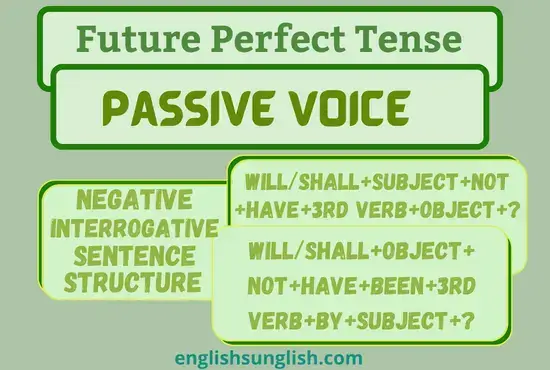
Examples of Passive Voice of Interrogative Sentences of Future Perfect Tense
- Will you not have blamed us?
- Shall we not have been blamed by you?
- Will they not have blamed her?
- Will she not have been blamed by them?
- Will he not have locked the cupboard?
- Will the cupboard not have been locked by him?
- Will they not have paid him the price in my presence?
- Will the price not have been paid him by them in my presence?
- Will he not have been paid the price by them in my presence?
- Will he not have helped them?
- Will they not have been helped by him?
- Will you not have planted a tree?
- Will a tree not have been planted by you?
- Will their brother not have turned out them?
- Will they not have been turned out by their brother?
- Will he not have pressed my shirt?
- Will my shirt not have been pressed by him?
- Will the doctor not have given them many injections?
- Will they not have been given many injections by the doctor?
- Will many injections not have been given by the doctor?
- Will she not have caught two birds?
- Will two birds not have been caught by her?
- Will the dog not have eaten bones?
- Will bones not have been eaten by the dog?
- Will they not have sold those plots of land?
- Will those plots of land not have been sold by them?
- Will they not have burnt those letters?
- Will those letters not have been burnt by them?
Future Perfect Tense-Active Voice
Future Perfect Tense in its Active Voice form use “will have/shall have”, as helping verbs with respective nouns and pronouns to express the completed actions of the Future time. The Active Voice of Future Perfect Tense can be made by following the rules mentioned:
